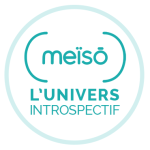Floating when pregnant
How is flotation a powerful tool for pregnant women?
Pregnancy is a wonderful journey, but it can also be full of challenges for body and mind. This is a unique period in a woman's life, marked by many physical and emotional transformations.
At Meïsō, we have created an experience that is a beautiful tool to accompany future mothers: floating in sensory isolation.
For those looking to relieve tension and find a moment of serenity, floatation relaxation is proving to be a particularly beneficial solution. This increasingly popular practice offers a welcome respite for expectant mothers. Let's explore why this method is recommended during pregnancy.
A feeling of weightlessness to relieve pain
Floatation relaxation, or sensory isolation, involves floating in water saturated with Epsom salts, allowing the body to levitate effortlessly. For pregnant women, this sensation of weightlessness is particularly valuable. The extra weight of the baby puts pressure on muscles, joints and the spine, often leading to back pain and muscle tension.
Floating in water relieves this pressure, giving muscles and joints a break. Floating helps reduce chronic pain and improve posture, which is crucial during the final stages of pregnancy.
Reduced stress and anxiety
Pregnancy is often accompanied by a certain amount of stress and anxiety, partly due to hormonal changes and concerns about childbirth and parenthood. Floating, by eliminating sensory stimuli, enables deep relaxation and a noticeable reduction in stress. The brain, freed from external stimuli, enters a state of relaxation similar to that of meditation.
This deep relaxation helps lower levels of cortisol, the stress hormone, and promotes the production of endorphins, the feel-good hormones. A floatation session can thus help improve mood and promote a sense of calm and serenity.
Improved sleep
Sleep during pregnancy can be disrupted by various physical discomforts and anxiety. Floatation helps to relax the body and mind, making it easier to fall asleep and improving sleep quality. Many pregnant women report an improved ability to sleep soundly after a floatation session, which is essential for their general well-being and that of their baby.
Benefits for blood circulation
Floating also helps improve blood circulation. During pregnancy, pressure from the uterus can impede venous return, causing swelling and varicose veins. Lying down in the water relieves this pressure, promoting better blood circulation and reducing swelling.
A special connection with baby
In addition to the physical and mental benefits, floating offers a tranquil space where expectant mothers can connect with their baby. Without the distractions of the outside world, they can concentrate on their baby's movements and enjoy this intimate moment. This enhanced connection can be a profound emotional and spiritual experience, enriching the bond between mother and unborn child.
Precautions and recommendations
It's essential to note that, although floatation is generally safe for pregnant women, it's important to consult a health professional before starting. Floatation practitioners, like those at the Meïso center in Paris, are trained to tailor sessions to the needs of pregnant women, ensuring that the water temperature is appropriate and offering personalized advice.
Conclusion
Floatation relaxation represents a unique opportunity for pregnant women to relax, relieve physical pain and reduce stress. The practice offers an interlude of well-being in an often hectic daily routine, enabling expectant mothers to take care of themselves and their baby. Floating in a tranquil environment, they find a space of calm and rejuvenation essential to getting through this period of transformation with serenity and confidence.
Floatation is very popular with women at an advanced stage of pregnancy. It's a gentle, non-invasive, natural method that can greatly improve the well-being of pregnant women. The sensation of being carried along by the water brings great relief. Some mothers even report feeling a better connection with their baby.
However, we recommend that you check with your doctor beforehand, and avoid flotation as you would any other physical activity during the first trimester of pregnancy.

Maïté BREGER
Maïté Breger is the co-founder of the floatation centers ( meïsō ). Trained as a Sociologist and Anthropologist at Paris V, she then specialized in the traditional healing practices of Southeast Asia before becoming a Sophrologist and creating (meîsō ). Passionate about the body, consciousness and the journeys of the soul, Maïté has been accompanying people in individual Sophrology sessions since 2016.
Find out more
Your article selection

Long Float : Pourquoi choisir 90 minutes de flottaison ?
Long Float Pourquoi choisir 90 minutes de flottaison ? Le monde va vite. Trop vite, parfois. Nos journées sont rythmées par les notifications, les impératifs,

Fans de Stranger Things : 7 raisons d’essayer la flottaison chez Meïsō
Fans de Stranger Things : 7 raisons d’essayer la flottaison chez Meïsō Si vous avez adoré voir Eleven flotter entre deux mondes dans Stranger Things,

Comment Stranger Things s’inspire de la flottaison
De la fiction à la réalité : Comment Stranger Things a remis la flottaison sur le devant de la scène ? Si vous avez

Meïsō au Salon ZEN 2025
Meïsō au Salon ZEN 2025 Après 10 ans à créer des espaces d’introspection, on se lance ! Du 2 au 6 octobre 2025, Meïsō sera

Flottaison pour les entrepreneurs : évacuer le stress et booster la productivité
Flottaison pour les entrepreneurs Evacuer le stress et booster la productivité La flottaison, une alliée pour les entrepreneur·es du nouveau monde La vie d’entrepreneur·e, c’est

Pourquoi une flottaison régulière transforme votre santé mentale et physique ?
Pourquoi une seule séance ne suffit pas Quels sont les bienfaits de la flottaison régulière Pourquoi une flottaison régulière transforme votre santé mentale et physique

